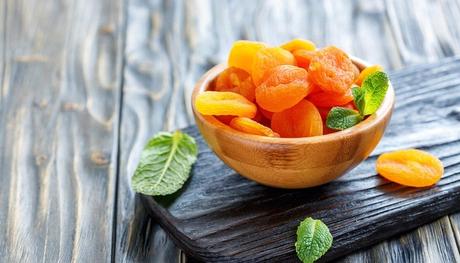
Finding foods to snack on can be a challenge, especially when you're on a diet. You either find foods high in calories or too much fat, which can raise your cholesterol and lead to weight gain. Dried apricots, however, can prove to be a wonderful addition to your diet.
Dried apricots are nutritious and super delicious, perfect for snacking on the go. Here's everything you need to know about dried apricots' nutrition profile so you can make more informed decisions for your health goals.
What Are Dried Apricots?

Apricots are fleshy, golden-colored stone fruits. When they are dehydrated - either through sun drying (solar drying) or by using special equipment like artificial dryers - to remove their water content, you get dried apricots.
The process gives the fruit a sweet, concentrated flavor and chewy texture. They're also more energy dense and offer multiple health benefits.
Dried Apricots Nutrition: All You Need to Know

Dried apricot is not only an excellent source of vitamins and minerals, but it's also fat-free and low in calories. Have it raw as a snack or add it to sweet and savory recipes for a boost of nutrition to your diet.
Take a look at their nutritional content, and you'll see why dried apricots are so appealing.
1. Antioxidants
Dried apricots contain flavonoids like catechins, chlorogenic acids, and quercetin, which can help our body neutralize free radicals.
Oxidative stress is shown to contribute to obesity and chronic diseases, so incorporating antioxidant-rich dried apricots in your diet can work wonders for your health goals.
It's also great for those with diabetes, as it can help improve the pathogenesis of diabetes while lowering the risk of any potential complications.
2. Calcium
Our bodies do not produce calcium on their own, so it's vital that we ensure our diet supplements this essential nutrient.
Dried apricots are a great source of calcium, which can help with weight management, maintain heart health, and reduce the risk of cancer and osteoporosis.
3. Potassium
Potassium is a natural mineral that helps regulates blood pressure levels, which can reduce the risk of high blood pressure in individuals with hypertension. It also works as an electrolyte and helps maintain the balance of fluids in and outside your body's cells.
A diet low in potassium can make you susceptible to heart disease, and eating dried apricots, rich in potassium, can be a great way to minimize this risk. As potassium works with sodium to maintain fluid balance, a good intake of dried apricots could also help prevent bloating and reduce blood pressure to lower your risk of stroke.
4. Soluble Fiber
Dried apricots contain a fair amount of fiber, which miraculously stays intact through the drying process! It can change the gut microbiome and alter the metabolic reaction to improve your gut health and aid with better digestion. This can help lower blood cholesterol and glucose levels.
It's also great for promoting satiety, causing you to feel fuller for longer. So, if you're weight-watching or have type 2 diabetes, incorporating dried apricots into your diet can give you great results.
5. Vitamin A
Just one cup of dried apricots can provide you with 94% of your daily vitamin A requirement. This is great as vitamin A offers a wide range of health benefits such as:
* Enhancing the health of your immune system and improving immune function
* Maintaining eye health by helping with night vision and protecting the eyes against the damage of free radicals
* Maintaining oral health by keeping the saliva flowing. This rids the teeth of damaging acid to ensure teeth health and helps prevent dry mouth
* Preventing night blindness and helping you see better at night while also keeping your corneas properly lubricated by producing moisture
* Preventing urinary stones by binding the chemicals together before they have a chance to reach the kidneys
* Stimulating the production of white blood cells, which are known for protecting your body against infections
Dried apricots are also a good source of beta-carotene - a type of pigment that converts into vitamin A (retinol) as per bodily needs. It does not just help fight free radicals in your body but can also reduce fine lines and wrinkles to give you healthier skin.
6. Boron
Dried apricots contain a decent amount of the micronutrient boron. It can have wonderful effects on bone mineral density and bone formation, which can help reduce your risk of bone disorders like osteoarthritis and osteoporosis.
7. Vitamin C
There is 1 mg of vitamin C in every 100 gms of dried apricots. This vitamin can neutralize free radicals and reverse the effect of environmental stress on your skin, helping improve your skin health.
8. Iron
In every 100 gms of dried apricots, you get 2.66 mg of iron, making it an excellent source of this nutrient. This stone fruit can ensure higher absorption of iron and help reduce anemia in the body.
A Word of Caution
It's easy to snack on dried apricots because they're small and tasty, but avoid overeating them.
Dried apricots are high in natural sugars like fructose and glucose. They also have a high-calorie count, with just 28gms of dried apricots containing 67 calories! So, excessive and frequent consumption could lead to weight gain and tooth decay.
Consume this delicious stone fruit in moderation to reap all the health benefits it offers without the side effects! And if you have digestive issues, it would be wise to start with a small amount to avoid dealing with an upset stomach.
As to how you can eat it, you have plenty of options - eat them raw as a snack, add them to your trail mix, use them for desserts, add them to salads, or make jams and preserves!
